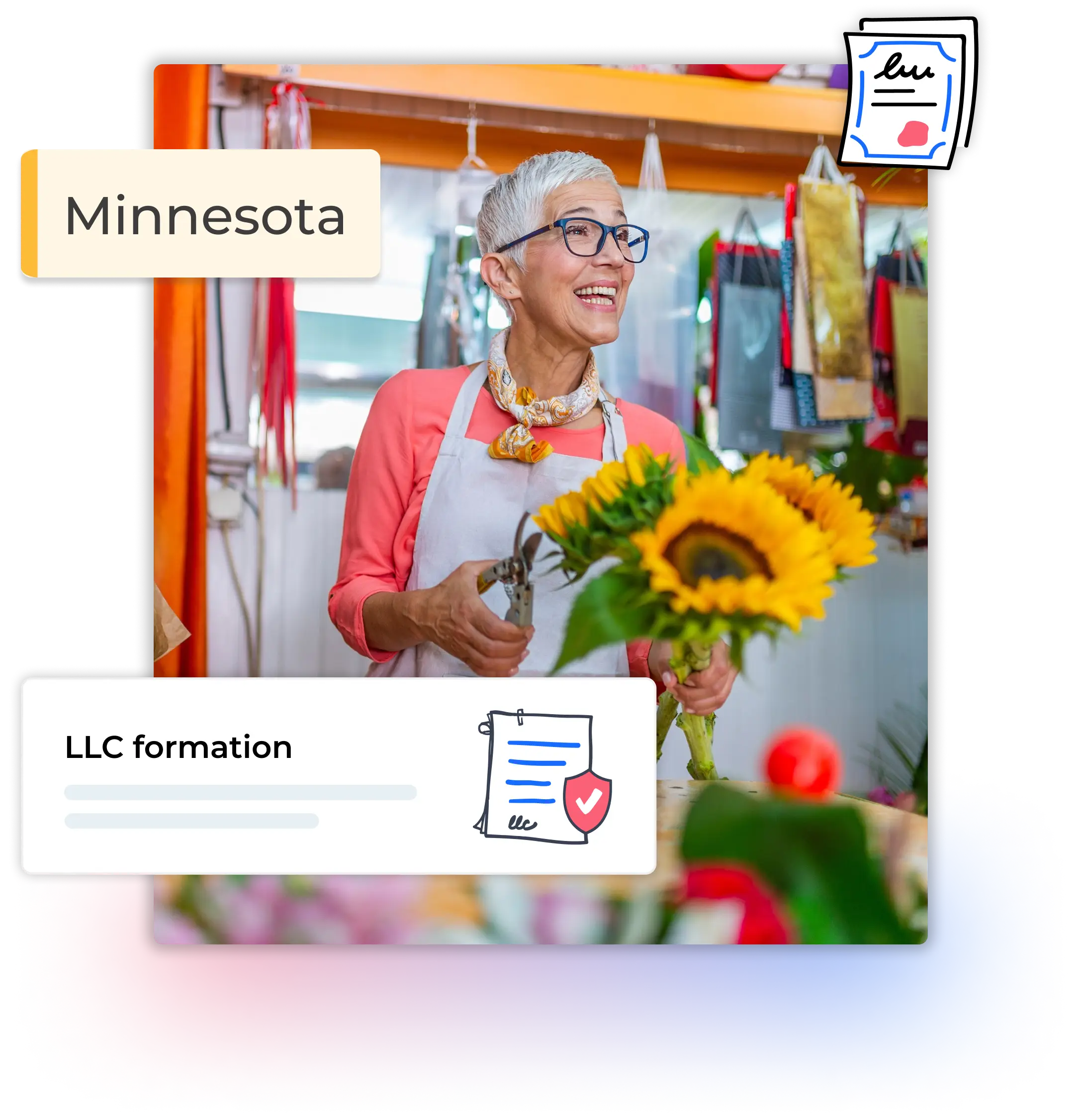Quick facts about forming an Minnesota LLC
| Filing Fee | $155 (online or in-person) or $135 (by mail) |
| Processing Time | 1–2 business days online; longer for mail filings |
| Annual Report Fee | $0 if filed on time; $45 late fee applies |
| Registered Agent Required | Yes, must have a physical address in Minnesota |
| State Franchise Tax | None for LLCs |
| Business License | No statewide license, but local or industry-specific permits may be required |
| Managing Authority | Minnesota Secretary of State |
How to start an LLC in Minnesota in 5 steps
If you’re starting your LLC in Minnesota, you’ve made a good choice. Registering an LLC, or limited liability company, in Minnesota is simple and straightforward. The initial registration fees are reasonable, and annual renewals are free if you send in the forms on time.
The business climate in Minnesota is excellent. CNBC ranked Minnesota the seventh best state in the country for business, giving it especially high marks for life, health, technology, innovation and education.
In this guide we’ve listed everything you need to know to form an LLC in Minnesota, read on to get started with your LLC!
You can create your Minnesota LLC in five main steps:
- Name your Minnesota LLC
- Choose your registered office
- File articles of organization
- Create an operating agreement
- Apply for an EIN
The detailed instructions below will walk you through each step.
Step 1: Name your Minnesota LLC
To form a Minnesota LLC, you need a name for your LLC that the secretary of state will approve. The name you choose must be different from the name of any other Minnesota LLC, corporation, limited partnership or limited liability partnership that is already on file with the Minnesota secretary of state. It also must be different from any reserved or assumed name, service mark or trademark that is registered in Minnesota.
Minnesota has some rules about what goes into the name, which:
- Must be expressed using English letters, whether the words are in English or another language
- Must contain one of these specific phrases or abbreviations: “limited liability company,” “LLC,” “professional limited liability company” or “PLC”
- Can’t contain the words “corporation,” “incorporated,” or any abbreviations of those words
- Can’t contain anything that would imply the LLC exists for a reason other than to serve a legal business purpose
To find out if your desired name is available, conduct a Minnesota business search:
- Call the Minnesota secretary of state at 651-296-2803, or
- Check online by following these steps:
1. Create an online account with the Office of the Minnesota Secretary of State, and sign in. Setting up an account is simple. You only need an email address and a password. Once you have an account, you’ll be able to use it for your future online business filings.
2. Go to the Search Business Filings page.
3. Scroll down to the File a New Business or Nonprofit section of the page. Click on “Limited Liability Company (Domestic).”
4. Type the desired name of your LLC into the search box, but don’t type the last part (“Limited Liability Company,” “LLC,” “Professional Limited Liability Company” or “PLC.”) Instead, select the last part from the drop-down box.
5. Select “Search” to find out if the name is available.
You can either request your LLC’s name when you file your articles of organization, which is the document you file to form your LLC, or you can reserve the name if you are not yet ready to file the articles.
Your desired name goes into the first box on the Articles of Organization form. Step 2 below has more information about filling out the rest of the form.
Step 2: Choose a registered office and, optionally, a registered agent
Minnesota makes a distinction between a registered office, which is a physical place, and a registered agent, which is a person or business. In Minnesota, unlike many other states, naming a registered agent is optional. However, you are still required to have a Minnesota registered agent office where you can receive service of process and other important notices and documents for your LLC.
The registered office can be in the place where your business is located, or it can be elsewhere in Minnesota. Its address must be a street address, rural route, rural route box, fire number, or directions from a landmark,but not a post office box. If you decide to get a registered agent, the agent’s address must be at the registered office.
You can locate a registered office and agent on your own, or you can let us take care of it for you with our registered agent service.
Step 3: File articles of organization
The Minnesota Limited Liability Company Articles of Organization is the form you file to make your business an official LLC. On this form, you’ll request your LLC’s legal name and provide your name and address, your registered office address, the name and address of your registered office, the name of your registered agent, if you have one, and names, addresses and signatures of the other organizers if you are not the only one.
State fees
Filing the Articles of Organization form requires a $155 state filings fee (or $135 if you submit it by mail). This is a main part of your Minnesota LLC cost.
Requirements
When you fill out the Articles of Organization form, you’ll provide:
- The exact legal name of your LLC. Remember that the name has to meet the state’s rules for LLC names, as discussed above
- A registered office address. This address should be a street address, rural route, or rural route box number in Minnesota. You can’t use a post office box alone
- In Minnesota, you’re not required to have a registered agent, but if you do, include the agent’s name on the form
- The names and street addresses of all the organizers. If you’re the only organizer of your LLC, just put your own name and address
- An email address where you can receive renewal and other important notices
- A name and daytime phone number for someone who can be contacted about the form
How to file
You can file by mail, in person or online. The mailing and in-person address is Minnesota Secretary of State Business Services, First National Bank Building, 332 Minnesota St., Suite N201, Saint Paul, MN 55101. In-person hours are 8 a.m. to 4 p.m., Monday to Friday, except for holidays.
To file online, first set up an account with the secretary of state if you don’t already have one, sign in, and go to the state’s business filings page.
The secretary of state’s office will answer questions at 651-296-2803 in the metro area or 1-877-551-6767 elsewhere from 9 a.m. to 4 p.m., Monday to Friday.
Step 4: Create an operating agreement
An operating agreement is a document that you use to control many aspects of your business. Having written rules in place will help guide your future operations and decision-making.
It’s especially important to have an operating agreement if your LLC has more than one member. In a multi-member LLC, the operating agreement forms a contract between the members. By specifying members’ roles, responsibilities and rights in the LLC’s operation, you can help anticipate and prevent disputes.
If you don’t have an operating agreement, your LLC will have to follow Minnesota’s default rules for LLCs, which may not be the best choice for your business. Creating an operating agreement gives you the chance to spell out how the rules for your LLC differ from the defaults. This is valuable for all LLCs, including single-member ones.
Some issues that your Minnesota LLC operating agreement may address include:
- Whether certain decisions and actions require the consent of all members. Such actions include admitting new members, selling LLC property, amending the operating agreement, and approving a merger
- Whether all members have equal voting rights
- Who will manage the LLC
- How distributions are apportioned to members
- What happens if a member leaves the LLC
- What procedures you will follow if you dissolve the LLC
Minnesota operating agreements don’t have to be in writing. They can be oral or even implied. However, you’re much better off putting the agreement in writing, which helps ensure that all the members have a common understanding of their responsibilities and obligations.
Every operating agreement is unique and based on the circumstances and needs of the LLC. The more aspects of the business the operating agreement covers, the more effective it will be. It’s a good idea to consult a lawyer when creating your operating agreement to ensure that all necessary items are included and are stated in a way that prevents conflicts, misunderstandings and other problems from arising.
Minnesota does not require that you create an operating agreement for your LLC, however it’s strongly recommended that you create one, so you can tailor the LLC’s rules to your business’s specific needs, prevent disputes, and help ensure the smooth running of your business.
Step 5: Apply for an EIN
An employer identification number is used for filing business taxes. If you have a multi-member LLC or your LLC has employees, you must get an EIN for your LLC. However, if you have a single-member LLC with no employees and you’re not choosing to be treated as a corporation, you have the choice of using either your own Social Security number or your own EIN on your taxes.
Advantages of having an EIN, even when it’s not required, include greater protection from identity theft and presenting a more professional image. Banks may require an EIN to open a business checking account.
You can apply for an EIN on the IRS website from Monday to Friday, 7 a.m. to 10 p.m. You can also choose to have Tailor Brands obtain an EIN for you as part of the services we provide for our customers.
FAQ
It costs $155 to file your Articles of Organization online or in-person, or $135 if you file by mail.
Most online filings are processed the same day or within one to two business days, while mailed filings take longer.
Yes, every Minnesota LLC must appoint a registered agent with a physical Minnesota address to receive official and legal documents.
Minnesota does not require an operating agreement, but creating one is strongly recommended to outline ownership and management details.
Minnesota LLCs must file an annual renewal each year, and there is no fee if it is filed on time.
Minnesota does not impose a franchise tax on LLCs, though members may owe state income tax based on the business’s profits.
Minnesota does not require a statewide business license, but many cities and specific professions require local permits or registrations.




